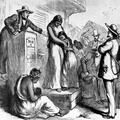Essay About The Adventures of Huckleberry Finn
The novel, Adventures of Huckleberry Finn, portrays the different stages of moral development of a young boy, Huckleberry Finn. Throughout the extraordinary adventures of Huckleberry Finn, you can grasp his stages of moral development. Author, Mark Twain, depicts this very well, by the way, Huck reacts to his hardships in the novel with maturity. This can be seen in his early stage of moral development with school, the dilemma of turning in Jim, and the occurrence at the flooded house. Huck is at first an uncivilized boy, but with time comes morals and feat.
Huck begins the novel as an uncivilized boy who lives in the woods; doesn’t go to school and doesn’t take baths. The regular norms of society are not apart of Huck’s young and uncivilized mind. In chapter four, he begins his early stages of moral development with the guidance of Widow Douglas. During this life-changing chapter, the biggest change comes to the boy, school. “At first I hated the school, but by and by I got so I could stand it…So the longer I went to school the easier it got to be. I was getting sort of used to the Widow’s ways, too, and they won’t so raspy on me.” (28). This quote was stated by Huck and shows that not only school is growing on him, but civilization in general. Also, it shows that Huck is beginning to adapt to his new life with Widow Douglas. This chapter is essential since it displays his first stages of moral development and maturity.
Another moment you can see Huck’s gain of morals is in chapter nine. In this chapter, Huck and Jim discover a flooded house on the river that was displaced from the storm. An inside is a dead man and Jim tells Huck not to look. This is the moment that I believe is a very important moral that Huck achieved, listening and respecting adults. Jim demands that Huck does not look at the man for it is “too gashly.” Huck responds to his father figure, Jim, “I didn’t look at him at all.” This quote is important because this is the first time Huck listens to an adult, let alone, a black adult. During this time Jim conveys to the audience that he is a father figure for Huck, hiding the fact that the man is actually Pap. Huck has become mature enough to trust and listen to Jim.
Chapter sixteen had one of the toughest decisions for Huck, but the greatest outcome in morality. The decision of turning in Jim, the slave, or leading him to freedom. The two unbreakable friends continue their incredible journey to Cairo, where freedom awaits Jim, but Huck has a moral crisis of right and wrong. He second guesses and thinks he should turn Jim in, back to Miss Watson, since he’s a slave and that is the “correct” thing to do. This heart-wrenching decision, all comes down to whether Huck should follow the rules of society and support slavery, or be loyal to his friend Jim and help him pursue his dreams of becoming free. Hereby, Huck gained a major moral, to serve mankind, even if society disagrees.
Dictionary.com defines a moral as “a lesson, especially one concerning what is right or prudent, that can be derived from a story, a piece of information, or an experience.” This single word truly describes the novel that is about a young boy’s moral development and how that relates to the society around him. These lessons are seen all throughout Huck’s adventure with the experiences that occurred. Huck begins as just a boy with no morals but ends as a boy with great morals. Mark Twain portrayed not only just Huck’s moral development but how moral development occurs in real life, for every human being.

